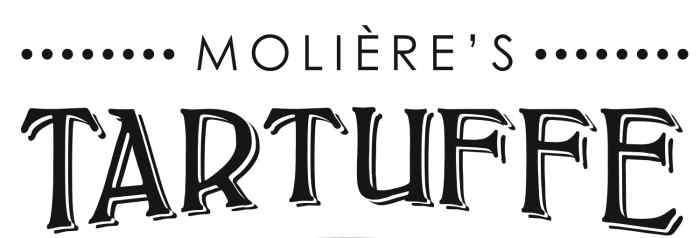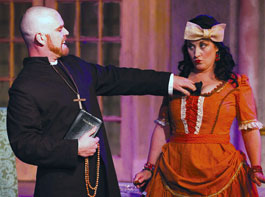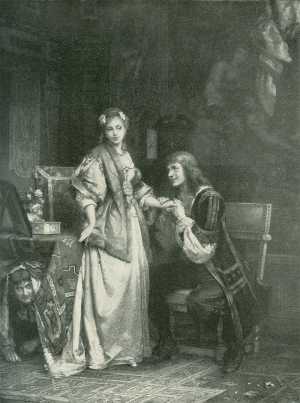Molière’s Tartuffe: The Mendacious Manipulator

Imposters are everywhere in this world that we all live in. You have more than likely been friends with an imposter at one point in your life. Detecting if people are who they say they are can be tricky because some of them are amazing at pretending. It seems like some people love being frauds and to some it is even their job because they are that good at fooling people. They get away with it and continue on to see who the next victim is after they have gotten what they wanted. For example, there are people in this world that pretend to be homeless in order to make money off of people that will feel bad for them because of their situation. In reality, these people are not homeless at all, but they have made the act of being homeless a part of their lives because they are so good at it. They are good at luring people in to give them what they want and they only have to put up their act for it. Imposters work in very mysterious ways so you must watch out for them.
Tartuffe depicts a character by the name of Tartuffe that one would come across and get fooled by very easily. Tartuffe is an imposter with no good motives at all. Being the great trickster that he is, he manages to enter a household and ruin the family dynamic that was present before he came into the picture. He is so good at what he does that he eventually becomes the heir of the master that allowed him into his home. Tartuffe has a goal entering this family’s home and he is getting what he wants because he has fooled the most important person in the house, Orgon who is the master. Tartuffe is after what Orgon owns and he also wants Orgon’s wife, Elmire. Tartuffe gains a lot of control within Orgon’s family. In the play, Molière conveys Tartuffe’s power over Orgon’s family through the use of tone, imagery, and conflict.
Tartuffe was allowed to live in Orgon’s household. He was picked up off the street and given a place to stay. Tartuffe managed to get his stay at Orgon’s home because he pretended to be something that he is not and Orgon fell for it. Tartuffe’s biggest supporters are Madame Pernelle and Orgon. Tartuffe’s biggest critics are Damis, Elmire, Mariane, Valère, Clèante, and Dorine. Tartuffe presents himself as a God like figure, religious, a saint, but he is none of that. He is just a great imposter that fooled some people into believing that he is all of that. The qualities that Tartuffe presents himself with are things that Orgon and Madame Pernelle love. They want someone like that in their lives because the godliness that Tartuffe pretends to have is useful. This can help them do what they have to do to make it to heaven. Tartuffe can teach them that, or so they think. Madame Pernelle falls for this image that Tartuffe presents and she really does believe that he “knows what heaven wants.” (84) Everyone else is not fooled by Tartuffe and they can see right through him. Dorine definitely sees what kind of person he is and she says it by stating that “he was just some beggar at the door / Whom we should have tossed. He’s a disaster!” (68-69) She is right, but Tartuffe is good at what he does and is able to fool the right people to get what he wants.
The use of tone
Tartuffe is a very convincing man because of his use of tone. The tone he sets out is very convincing. It is subtle, apologetic, careful, delicate, and discerning. His tone has everything it needs to play off as an imposter and get himself out of sticky situations. His tone is detected throughout the play and you can get a great glimpse of it in action when Damis overhears Tartuffe expressing his feelings of love that he has for Elmire.
If Tartuffe is the great and holy person he says he is, then why is he lusting over Elmire and expressing his feelings he has about her to her when she is a married woman. She is married to Orgon, the person who took Tartuffe into his home. Tartuffe should not be doing what he is doing and Damis catches him in action. Damis lets his father know what is going on so his father can finally get rid of Tartuffe, but Tartuffe pulls out his tone to fool Orgon and make him think that his son is lying. Tartuffe tells Orgon, “No, let him have his say. / And don’t accuse him. Don’t send him away. / Believe his story––why be on my side?” (23-25) His tone is subtle, demoralizing, and victimized. He doesn’t shout when he speaks and instead of defending himself and stating that he didn’t do what he was being accused of, he defends Damis and tells Orgon to believe his son. Orgon’s moral right is to believe his son, but when Tartuffe tells him that that is what he should do, that undermines Orgon’s morals. Tartuffe is psychologically messing with Orgon’s mind. He confuses Orgon because Tartuffe should not be defending Damis and because he is, that makes Orgon think that Tartuffe is telling the truth and not Damis.
Psychologically, he makes Orgon ask himself why Tartuffe would be defending his son and what his motive to it could be. Tartuffe is godly; therefore, he is taking the blame and has no negative motive so he must be telling the truth. The fact that Tartuffe never says that he didn’t do it also corrupts Orgon’s mind. Tartuffe is playing the victim card and again messes with Orgon’s head. It makes Orgon believe that Tartuffe is just being mistreated. Not a lot of people will just take the blame right away and because he does that so quickly, Orgon believes he’s telling the truth and that his son has lied. Tartuffe gains great power just like that and wins Orgon over onto his team.
The use of imagery

Through the imagery in the play, we are able to see the way Tartuffe acts, which is another form of how he gains control over this family. When he is around everyone, he presents himself as a very sophisticated human being. He acts like a saint and tries to make everyone believe that he is a good person. In act three, scene two, Dorine has her chest area displayed a bit and in order to make everyone believe that he is godly, he advises her on what to do about that because she should not be showing her bust. He takes the handkerchief that he had in his pocket and tells her, “Good heavens, please, / Do take this handkerchief before you speak.” (7) He tells her to cover up and she does not care what he says to her because she knows he is an imposter.
She can see right through his act, but as for Orgon and Madame Pernelle, these types of actions from Tartuffe make them believe that he is a very religious person that knows heaven and what it desires. Everyone, except for Orgon and Madame Pernelle, are not fooled by Tartuffe because he became the head of the household so quick. Everything that they do is considered a sin by him. They can tell that he is lusting over Elmire and they do not believe he can show them the way to heaven. They know it is an act because he was a human stray before coming into the house. Madame Pernelle thinks that everyone should become holier and get their morals together. The fact that this man that says he is godly makes her like him because he has the qualities that she has. Orgon feels the house can use someone like him to teach them the way to heaven. Orgon and Madame Pernelle become vulnerable to this act of Tartuffe because they both seek the way to heaven and if Tartuffe can show them the way, then they want him aboard. As long as Tartuffe remains teaching the family right from wrong, Orgon and Madame Pernelle will keep believing that he is a saint.
The use of conflict
Throughout the play, Tartuffe just keeps gaining and gaining more control within the family. When conflict comes into play, Tartuffe becomes the voice of reason and this grants him more control. When Orgon is told that Tartuffe was caught expressing his feelings to Orgon’s wife, Orgon believed that that was a lie. He did not believe his son and believed Tartuffe instead. Orgon felt that this was a rumor that was made up by Damis and a malicious thing that he was doing to Tartuffe by trying to damage his persona. With this conflict, Tartuffe decided to be the voice of reason and find a solution to this problem.
Tartuffe says, “To prevent rumors. My absence, my defense–– / I’ll never see your wife again, and hence––.” (32-33) He tells Orgon he will never go near his wife so things are not made up about the both of them having some kind of relationship that is not okay to have. Again, Tartuffe is messing with Orgon’s head and because Tartuffe is offering to stay away from his wife, why wouldn’t he believe Tartuffe? If Tartuffe is telling Orgon that he has no problem staying away from her, then that fools Orgon to believe that he would not do such a thing. If Tartuffe really wanted Orgon’s wife, Tartuffe wouldn’t offer to stay away from her, but find some other solution. Tartuffe knows what he is doing. If he offers to stay away from her, he knows Orgon will think that he actually doesn’t want her. Well, this solution to this conflict that Tartuffe has in mind only grants him more power because Orgon then offers him to spend more time with his wife. He tells Tartuffe, “ No. You spend every hour with her you want, / And be seen with her.” (34-35) Tartuffe gets what he wants and that is more time with Elmire and he was able to do that through this conflict by offering a solution that he knew would work in his favor. He is very manipulative and is great at it.
Goodbye Tartuffe

It took Orgon and Madame Pernelle a while to figure out what Tartuffe was really all about. They didn’t witness the things that he would do that the others witnessed. Tartuffe kept up his holy image so well that when Orgon was told these awful things that Tartuffe was doing, he wouldn’t believe anyone. Orgon and Madame Pernelle had to witness his actions to believe that Tartuffe was a fraud. Everyone else in the house finally decided that it was time to get them to witness who Tartuffe really is. One of the ways they did this was by finally getting Orgon to witness that Tartuffe does lust over his wife. Elmire convinces Orgon to hide under the table and hear Tartuffe lust over her while he is made to think that the both of them are alone, but Orgon is hiding and listening. Once Orgon is able to witness Tartuffe being an imposter, he is able to side with everyone else and realize how well this guy fooled him. He was a religious charlatan with a negative motive and he got what he wanted to an extent from this family.
Works Cited
Molière. “Tartuffe.” The Norton Anthology of World Literature. Martin Puchner. Shorter Third Ed. Vol. 2. New York: W. W. Norton, 2013. 14-68. Print.
What do you think? Leave a comment.











The written word’s not half as witty, nor as interesting, as people living the lines on stage.
Molière is a master of satire.
Tartuffe is great. I both read the play, and then watched version of it on Youtube.
I read this in my English class and I really enjoyed it! It was the first comedy I’ve read over all four years of high school and it was a breath of fresh air after all the tragedies.
Tartuffe is one of Molière’s finest comedies!
drama, drama, so much drama.
Saw a production of Molière’s Tartuffe over the weekend, and the text sounds surprisingly modern for a 17th-century play.
Haha, I’m glad they got him in the end!
such a good play, I read it in my English class at the beginning of the semester. It has become one of my favorites!
I read Tartuffe for the first time this year in my world lit class. It’s really quite funny and enjoyable! I want to see a live production of it some time. I’ve heard it’s even better on stage.
The idea of the Impostor is very prevalent in our comedies today, but usually relies on slap-stick comedy than wit; I would never say it is more or less defined than the wit seen in any of Molière’s works. I think the climate is different now, but something can be said for the possibility of an underground movement of modern comedy going back to classic pros.
Tartuffe offers timeless insight into the follies of humans.
Tartuffe is an excellent play to introduce to collage students the art of drama. While Moliere roots his drama in the classical tradition of stock characters, the lessons revealed about human behavior are timeless.
I really liked the character of Dorina. There are also some life truths that sound very well in verses.
Wicked funny. Or rather, wicked and funny.
Read this in French in high school. I’ve also seen it performed a couple of times, and its good every time I go.
I remember reading this play in my freshman year of uni. Probably much funnier on stage, but entertaining and smart nevertheless. Very good, thorough post.
Is the image you’ve used within the public domain? I’m looking for an image for a program cover.